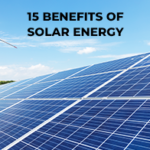What Is An Energy Efficient Home?
The demand for energy-efficient homes has increased as the world becomes more conscious of its carbon footprint. Homeowners can reduce their power costs and contribute to environmental protection with an energy-efficient home. These houses offer tenants a comfortable living environment while minimizing energy consumption. A house with energy efficiency will be discussed in this article.
What are Energy Efficient Houses?
A home that is energy effective will reduce the amount of power used, greenhouse gas emissions, and the need for power sources that are not renewable. Additionally, it can provide more healthy, healthier living environments. Energy-effective homes could also save you money.
Home Energy Efficiency: Why Is It Important?
The primary purpose behind energy-effective homes is to reduce the use of fossil fuels and the destruction of forests. Therefore, our houses and daily lives do not contribute to global warming similarly.
It will give us a better chance of keeping the planet’s climate in a state that allows the Earth’s ecosystems to continue to thrive. Only through this can we safeguard animals and plants from extinction and ensure that humans have the most excellent chances of a sustainable future.
Primary Purpose Of these Houses
The primary purpose behind energy-effective homes is to reduce the use of fossil fuels and the destruction of forests. Therefore, our houses and daily lives do not contribute to global warming similarly.
It will give us a better chance of keeping the planet’s climate in a state that allows the Earth’s ecosystems to continue to thrive. Only through this can we safeguard animals and plants from extinction and ensure that humans have the most excellent chances of a sustainable future.
Energy-Efficiency Checklist
If you’re considering buying an energy-regulated home, there are many aspects to look for. Among the most important are the following:
- Structure: A larger home is usually less efficient since it requires more power to cool and heat. In addition, bigger homes typically contain more lights and appliances, and other features that consume power.
- Features: Find homes that already have eco-friendly features. Among them are solar panel systems, heat pumps for cooling and heating power-efficient appliances, and rainwater collection systems.
- Design of the building: House layouts and techniques can impact power efficiency. For instance, open-concept homes tend to be more energy regulated than houses split into smaller rooms, as it is easier to regulate the temperature and requires fewer building materials to build.
- Insulation: Good insulation is necessary to keep your house cool during all seasons Spray foam insulation is generally thought of as the best efficient kind of insulation.
- Windows and doors: The most efficient and well-sealed windows and doors can reduce power and cooling expenses. To increase efficiency, add shades for windows to prevent drafts that can cause cold during winter months and to keep the heat out during summer.
- Sources of energy: Some homes rely entirely or in part upon renewable power sources such as solar energy. Houses with solar panels may be more costly. However, they can help lower your monthly bills. Certain states offer incentives to homeowners who own solar panels.
- Quality of indoor environment: A well-designed ventilation system can boost the house’s effectiveness and reduce indoor air pollution.
- Landscaping: Search for houses with drought-tolerant plants, particularly in dry areas that don’t receive much rainfall. Drought-tolerant plants include lavender rose, rosemary, aloe, and Geraniums.
Energy-effective homes can also reduce the price of cooling, heating, and power. They also impact positively on the surroundings. If your home uses less power, it releases essential resources, such as water, and reduces dependence on commercial materials, typically producing large quantities of greenhouse gases.
Hoous Energy Efficiency Challenges
- Upfront Costs: Constructing an energy-efficient home can be more costly upfront due to the expense of high-quality insulation, windows, and power-regulated heating and cooling systems.
- Materials Accessibility: In some places, it may be challenging to locate power-efficient building materials, raising the overall construction cost.
- Design Considerations: Constructing a power-regulated home requires careful consideration of the building design, which may be more intricate than a conventional residence.
- Maintenance Needs: These houses may require additional upkeep to guarantee all components function optimally and efficiently.
Conclusion
It is a wise investment that can benefit homeowners and the environment. High-quality insulation, power-efficient windows and doors, regulated heating and cooling systems, energy-saving lighting, and renewable power sources increase home value and help protect the environment. We can build a more sustainable future and profit from an efficient house by adopting these improvements. Upgrade your home’s energy efficiency with our expert services and start saving on bills today. “US Energy Discounts” provide home energy efficiency services at cheap rates in the US.





